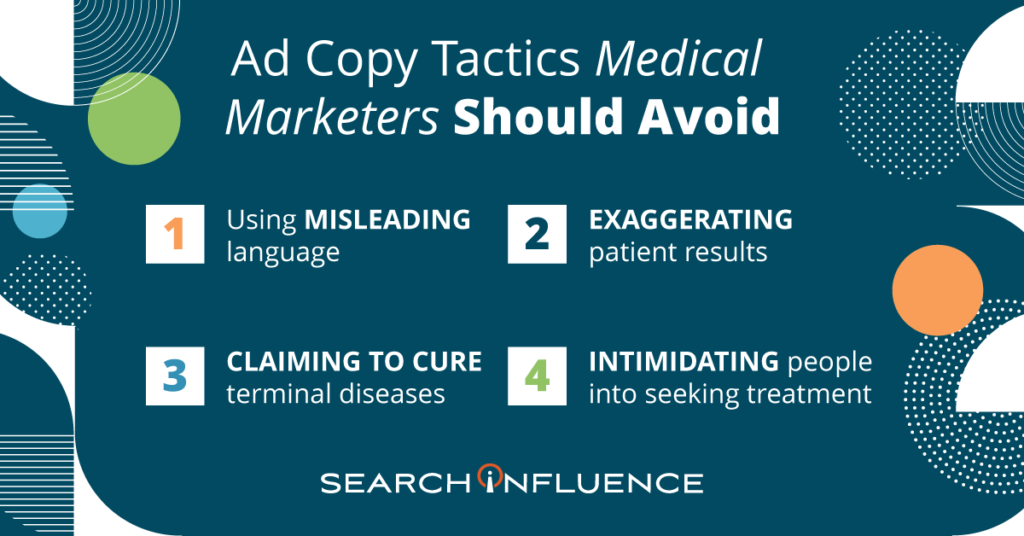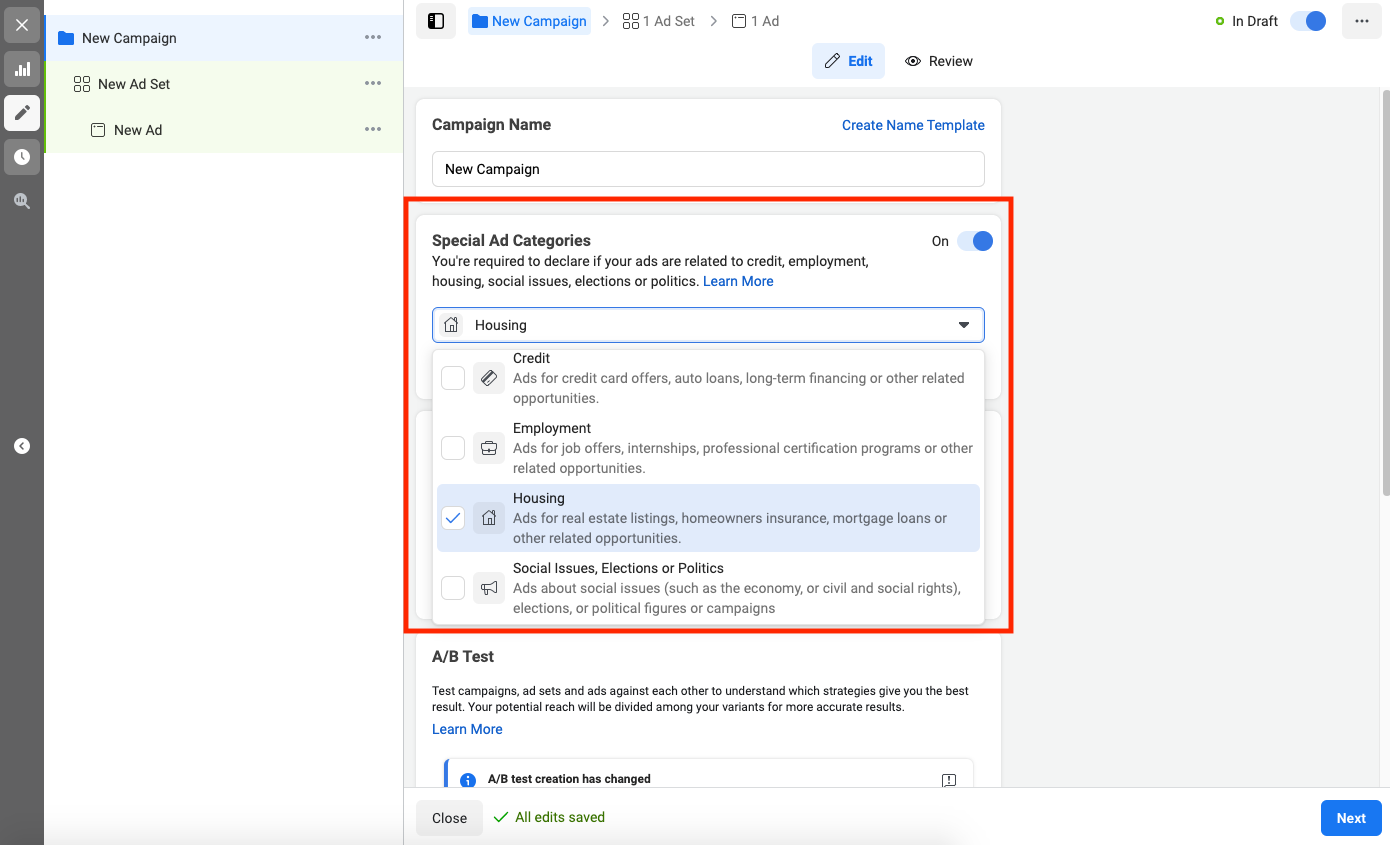Healthcare Marketing Laws: Language to Keep Your Ads Legal
December 21st, 2020 by
This post was updated by Jordan Polhemus on December 21, 2020 to reflect recent trends and refreshed statistics. It was originally published on November 26, 2019.
Key Insights
- Review your current Facebook targeting strategies to determine how the recent changes to Facebook’s targeting options will impact your campaign’s performance.
- Review your entire messaging and targeting strategy with your legal team before launching any marketing campaigns.
- Prepare for more health regulations within the Facebook advertising platform.
The healthcare industry, unlike almost any other industry today, has incredibly strict advertising regulations that both individual physicians and large hospitals must follow. Violating these regulations could lead to anything from ads not being permitted on certain platforms to legal action—or even a revocation of a physician’s license.
This post covers the do’s and don’ts for ad copy and demographic targeting to keep your ads legal in an ever-changing healthcare marketing landscape. Please note that this is not an exhaustive list of everything you should and shouldn’t do for medical marketing. It’s an overview of advertising best practices within the medical industry. Additionally, these recommendations do not include all the specifics for every state.
Changes to Facebook Advertising Targeting
Facebook has made several changes to their targeting options since 2019.
The Removal of Third-Party Information
The most impactful difference is the removal of third-party information that gave organizations the ability to target users based on personal information, such as (but not limited to):
- Income
- Cars owned
- The age of user’s house
- The age of the people in the user’s household
Before this update, many data providers partnered with Facebook to create a more descriptive profile of their users that allowed marketers to create extremely detailed and specific targeting.
After the Cambridge Analytica scandal, Facebook decided it didn’t want to be responsible for the data that third parties brought in, so it eliminated Partner Categories and other third-party data programs.
The Removal of Potentially Discriminatory Targeting
Facebook has worked to remove potentially discriminatory targeting to prevent misuse of the ad platform in the future, including:
- Race
- Religion
- Ethnicity
- Sexual Orientation
Facebook’s “Special Ad Categories”
In the last few years, we’ve seen a considerable tightening in what marketers can do when promoting organizations in certain industries. The types of ads impacted include:
- Housing
- Employment
- Credit card
- Political
Predictions for the Medical Industry
Although this isn’t the case yet in the medical industry, we believe that Facebook will move in this direction soon and require all medical providers to follow additional guidelines, which will place further restrictions on their targeting and messaging. Although not currently in place, you will likely have to choose a “special ad category” to advertise in the medical industry on Facebook in the future.
For example, if you are running ads for any political organization, such as a political candidate, PAC (political action committee), or even for small local elections, the advertiser and the ads must comply with a very strict set of rules, including:
- Verifying the page
- Providing special documentation proving the identity of the page manager
- Complying with specific messaging guidelines

Advertising Language Do’s and Don’ts
Advertising cannot be misleading in any way
Misleading or deceitful language is strictly forbidden in all medical advertising. This includes implications that would cause a reasonable person to misunderstand or be deceived. Consider the impact of the words you choose in your Healthcare SEO strategy as well.
Examples:
- “This procedure will heal you.”
- “You will look just like Kim Kardashian.”
- “You will never need to see another doctor again”.
Don’t use words like “best” or “superior”
Unless there is objective evidence to support the claim, practices cannot claim professional superiority in any way.
Examples:
- “We are the best plastic surgeons in the world.”
- “You will be under the care of the greatest ophthalmologist in your area.”
- “Make an appointment with the most talented doctor.”
Don’t use hyperbole when describing your techniques or results
A potential patient’s health should be discussed factually and without embellishment, so using exaggerated statements or claims (even if they’re not meant to be taken literally) can be seen as deceptive and misleading.
Examples:
- “Your skin will be softer than silk.”
- “Make an appointment for the best day of your life.”
- “You’ll be as skinny as a toothpick.”
Don’t assure a permanent cure for an incurable disease
Don’t use intimidation or undue pressure for services, products, or procedures
Examples:
- “If you don’t get this procedure done by ____doctor, then you will die”
- “If you don’t see Dr. X, then you are doing a disservice to your children”
Don’t make any scientific claims unless you provide a reliable, peer-reviewed study as evidence
Because of the amount of trust patients put in their healthcare providers, physicians are required to provide truthful information when making healthcare decisions and recommendations.
Therefore, it would be an ethical violation for any practice to claim results or benefits that cannot be scientifically proven, whether or not that physician is talking to their own patient.
Example:
- “Getting X surgery will extend your life by 15 years”
Don’t show before and after photos without the proper disclaimers
Because before and after photos can influence a patient’s decision-making process, each practice must clearly state that results may vary and the results shown are not guaranteed. Otherwise, patients could reasonably expect to see similar outcomes.
Practices must include disclaimers alongside perceived claims, even if the claims are direct quotations from past patients.
Don’t reveal patient details
Anonymizing patient information isn’t as simple as changing a name. Under HIPAA, there are more than 18 categories of personal health information (PHI) that can result in patient identification.
It is best to either create a fictional scenario in your messaging or work with your attorney to secure a no-compensation, signed patient release before using any of their PHI in advertising.
Don’t make any claim about the cost of a service or product that your practice cannot substantiate
Due to differences in medical coverage based on health insurance, advertisements should never include prices—unless the practice can ensure that all patients receive that price regardless of their healthcare coverage.
Don’t use a competitor’s name or any other trademarked name in ad copy or advertising without written permission
If you wouldn’t say it in the elevator, don’t put it online
Try reading the content of a post out loud and to others before posting. If it sounds like something you wouldn’t say in an elevator (where you can be overheard), then it shouldn’t be something that you put in advertising.
Have your marketing plan, including ad copy, reviewed by an attorney to confirm that no laws are being broken in any of the states your ads will appear.
By working with both large hospitals and small private practices, we’re well-versed in medical marketing and have years of experience running successful campaigns for our clients. Our digital marketing agency keeps up to date with the latest medical search trends, as well as updates to regulations and best practices.
As a Google Premier Partner, the majority of Search Influence’s employees are certified in Google’s advertising platforms, including Search, Video, Mobile, and Display, just to name a few.
For more information about how we can help promote your practice on Facebook and other social media platforms, start a conversation with us today.
Resources
- Health Insurance Portability and Accountability Act
- HIPAA privacy regulations
- American Medical Association
- The American Medical Association Code of Medical Ethics
Images



